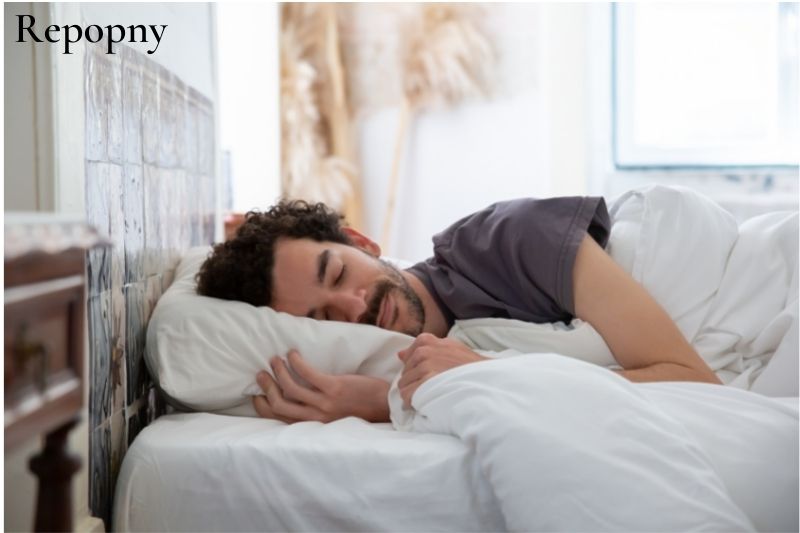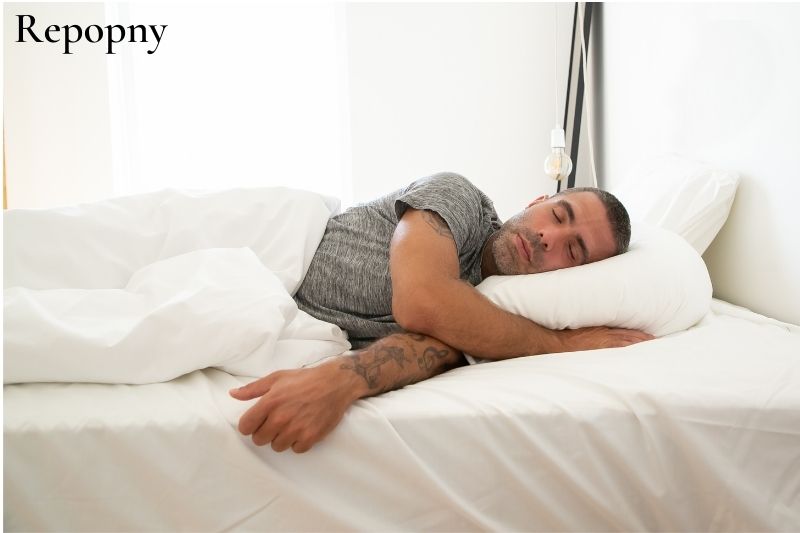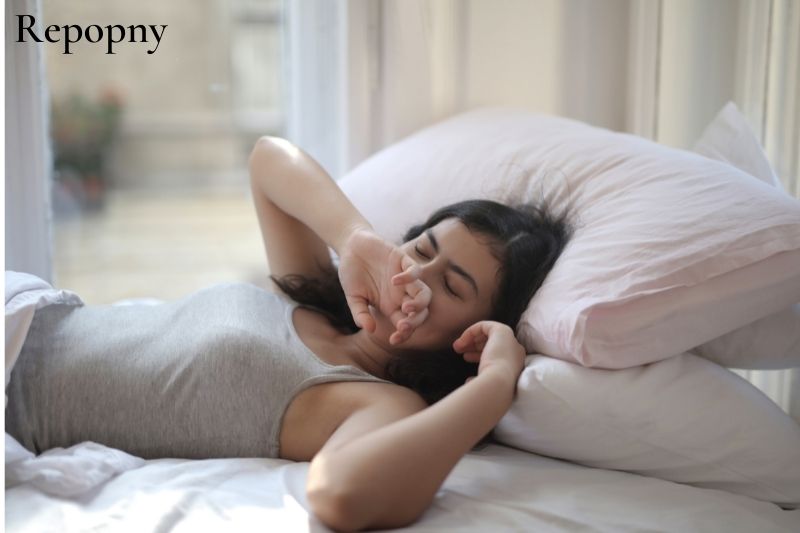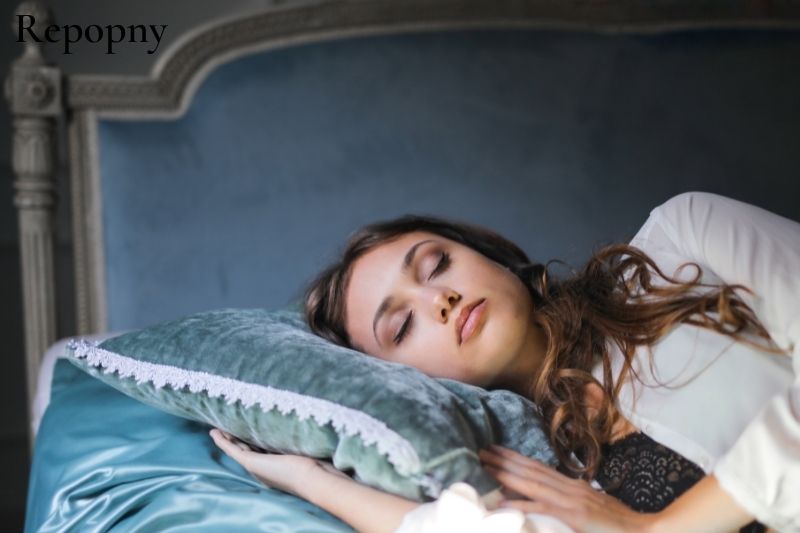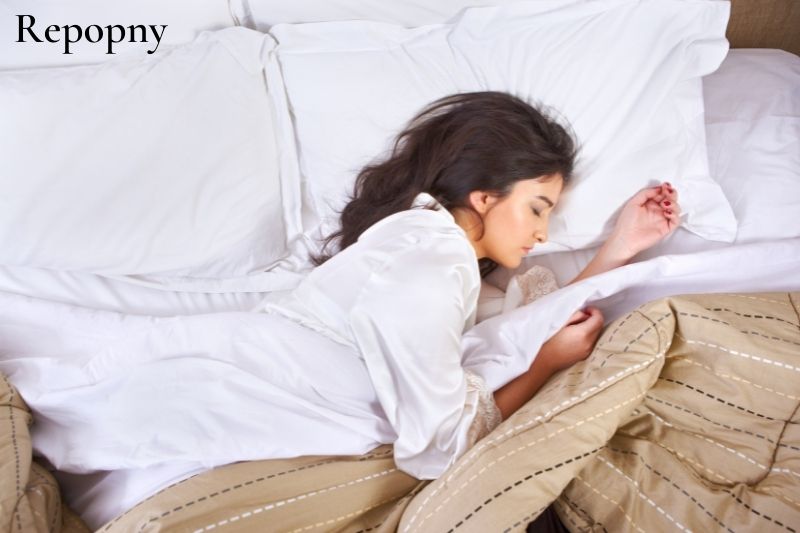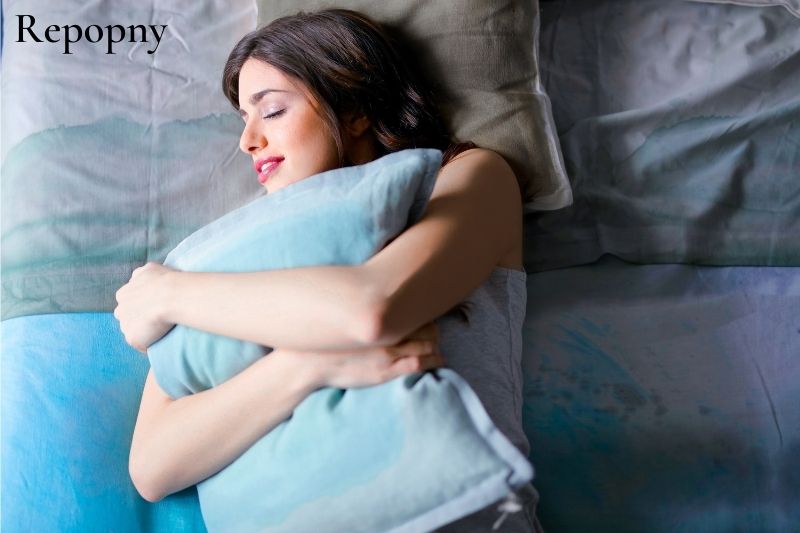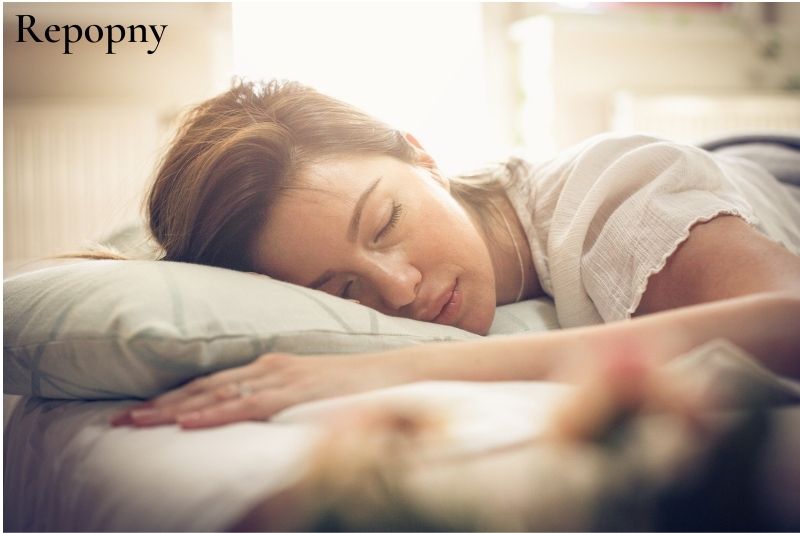The coronavirus pandemic has forced many changes in our lives, including how we sleep. If you’re one of the millions of people working from home, you may be finding it harder to get a good night’s sleep. In this guide, Repopny will provide some tips on how to sleep with covid.
Contents
- 1 How Difficult Is It To Sleep During A Pandemic?
- 2 What Is the Importance Of Sleep During A Pandemic?
- 3 Our Tips For Getting A Good Night’s Sleep During The COVID-19 Pandemic
- 3.1 Make a Schedule and a Routine
- 3.2 Make a Sleep Reservation in Your Bed
- 3.3 Adjust Your Lighting Exposure
- 3.4 Naps Should Be Taken With Caution
- 3.5 Continue to Be Active
- 3.6 Exercise Kindness and Build Relationships
- 3.7 Application of Relaxation Techniques
- 3.8 Watch What You Eat and Drink
- 3.9 If Necessary, Contact Your Doctor
- 4 FAQs
- 5 Conclusion
How Difficult Is It To Sleep During A Pandemic?
Millions of people had insomnia before COVID-19, and the epidemic has sadly generated a slew of new issues for them and those who previously had no trouble sleeping.
The term “coronasomnia” was coined to describe sleep problems caused by the pandemic. COVID-19 has modified and interrupted sleep habits in a variety of ways during the last two years, according to doctors and sleep scientists. Sleep issues affect over 40% of people, and studies have found significant increases in insomnia symptoms in adults5 and children and adolescents.
While some people claim to have gotten total sleep due to the pandemic, high-quality sleep has often worsened. Many people report having trouble falling asleep at first, being plagued by sleep interruptions, having unsettling nightmares, and feeling drowsy during the day.
Although the end of lockdowns allowed some people to sleep better, many others have continued to have sleep problems, as repeated waves of COVID-19 added to long-term stress and pandemic fatigue. Short-term sleep disorders can become chronic, putting millions of people at risk of long-term sleep problems.
Of course, not everyone is affected by the COVID-19 epidemic in the same manner. Patients infected with the virus and front-line medical personnel bear the brunt of the disease’s direct effects. However, the ramifications have spread far and wide, offering a variety of substantial sleep difficulties.
COVID-19 and infection
COVID-19 is a coronavirus infection produced by the SARS-CoV-2 coronavirus. COVID-19 patients typically suffer sleeping issues, according to research9. Cough and fever and the use of some drugs can make it difficult to stay asleep.
Sleep disturbances have been observed in both hospitalized and non-hospitalized COVID-19 individuals. Furthermore, many persons with protracted COVID, long-term health impacts months after infection, report having sleep problems10.
Daily Life Disruption
People of all ages and walks of life experience substantial changes in their normal routines due to social isolation, school closures, quarantines, and working from home. These alterations, not unexpectedly, can contribute to sleeping problems for a variety of reasons:
- Adjusting to a new daily schedule, or the lack thereof, can be challenging.
- Without standard time “anchors” like dropping kids off at school, arriving at the office, attending frequent social activities, or heading to the gym, keeping track of the time, and even the day, can be difficult.
- Changing schedules might result in erratic bedtimes and waking times, reducing sleep time or triggering oversleeping, which can make you feel sluggish, irritated, or unfocused during the day.
- Being confined to one’s home, especially if bright light levels are low, may impair light-based cues for awake and sleep, known as zeitgebers, which are critical to our circadian rhythm.
Caregiving
If a family member or friend contracts COVID-19 and needs to isolate or quarantine, you may be thrown into the role of carer. During the epidemic, primary care provider experienced disrupted sleep, which could be due to stress and worry. Caregiving responsibilities can reduce the amount of time available for unbroken sleep.
Even if no one in the family is unwell, sleep might be disrupted13 due to increased family duties resulting from school closures and more time spent at home.
Too Much Screen Time
The epidemic can cause a significant increase in screen usage, whether checking the news on your phone, joining a Zoom with family, binge-watching Netflix or spending extra hours looking at a computer while working from home.
Excessive screen use, particularly later in the evening, might interfere with sleep. Screen time can stimulate the brain in ways that make it difficult to unwind, and blue light from screens can decrease the body’s natural synthesis of melatonin, a hormone that helps people sleep well.
Furthermore, researchers have discovered that attempting to keep up with the pandemic’s news can contribute to poor sleep by increasing stress and causing further increases in screen time.
Worry And Anxiety
Concerns about the COVID-19 epidemic exist. Many people are afraid of contracting SARS-CoV-2 because they do not want to get sick or spread it to others. Most people have close friends or family members who are older or in high-risk groups due to preexisting diseases, which causes them to be concerned about their overall health and safety.
Nearly everyone is affected by economic issues. Lockdowns halted economic activity and resulted in widespread job losses at first. As the economy recovers, concerns about supply chains and inflation are causing many individuals and families to be concerned about their income, savings, and ability to make ends meet.
As a result, it’s not unexpected that the epidemic has been linked to a rise in anxiety disorders15. Long before the epidemic, it was well understood that anxiety could interrupt sleep by keeping the body tossing and turning due to a racing mind.
Even two years later, there is still so much uncertainty about this pandemic whether new virus strains may arise, how long vaccines will provide protection when life returns to normal that fears and anxiety will undoubtedly continue to afflict people worldwide.
Isolation And Depression
A sense of crisis can lead to depression, which can be exacerbated for those with a loved one who is unwell or has died from COVID-19. Isolation from people can worsen trauma, sadness, and depression, all of which have been shown to produce severe sleeping problems.
More than sorrow might be a symptom of depression. Loss of interest or pleasure in activities, feelings of hopelessness or worthlessness, and a poor appetite or overeating are all possible signs. Researchers found that during the pandemic, the rates of depressive symptoms tripled and that a lack of sleep and an increase in alcohol and tobacco intake were linked to increases in depression rates.
Depression and sleep issues regularly coexist and even exacerbate one another. Depression can coexist with anxiety and other mental health issues, causing sleep disruption.
Stress And Fatigue Caused By Stress
As a result of the pandemic, many people are under tremendous stress, which frequently causes or worsens sleeping problems. Vacations that have been canceled, limited face time with family and friends, and an abundance of time spent at home may put anyone under stress.
Keeping up with work-from-home duties, managing a house full of school-aged children, and attempting to keep up with pandemic news and regulations can all cause stress and discontent.
Chronic stress can cause a variety of mental and physical symptoms, such as insomnia, migraines, memory errors, and digestive issues. Stress can also cause weariness, leaving you unmotivated and low on energy, even if you are receiving enough sleep at night.
Different Dreams
Several studies have found that dream activity has shifted due to the pandemic. People who have had COVID-19 experience more nightmares, and in general, people remember more of their dreams, which generally contain negative or distressing imagery. Disrupted sleep can lead to worrying dreams, leading to tension and anxiety, making it challenging to get a good night’s sleep.
What Is the Importance Of Sleep During A Pandemic?
Sleep is an essentially biological process, and it’s probably more necessary than ever as we juggle the pandemic’s mental, physical, and emotional demands. Consider the following example:
A healthy immune system is aided by sleep. A good night’s sleep helps boost our bodies’ defenses, which can help us avoid infections. Lack of sleep has also been shown to reduce the effectiveness of several vaccines.
Sleep enhances our brain functions, and our minds work better when we get plenty of it. Complex thinking, learning, memory, and decision-making benefit from a good night’s sleep. Good sleep can help adults and children adjust to new work and school environments and stay focused.
Sleep improves one’s mood. Sleep deprivation can make people angry, sap their vitality, and exacerbate or cause worry and melancholy.
Sleep is beneficial to one’s mental health. In addition to anxiety and despair, research has connected a lack of sleep to mental health issues such as bipolar illness and post-traumatic stress disorder (PTSD).
Experts believe that receiving the correct quantity of good sleep regularly improves nearly every element of health, which is why it deserves our attention during the COVID-19 pandemic.
Our Tips For Getting A Good Night’s Sleep During The COVID-19 Pandemic
Despite the enormous hurdles, a few actions may be taken to help people sleep better throughout the pandemic.
Don’t give up if your efforts don’t provide results right away. It may take some time to get your sleep under control, and you may need to modify these sleep tips to meet your specific situation.
Make a Schedule and a Routine
Even amid adversity, sticking to a routine might help you maintain a sense of normalcy. It’s easier for your mind and body to adjust to a consistent sleep pattern, so health professionals have long advised against making significant changes to your daily sleep schedule.
Aspects of your daily schedule that are unique to sleep should include:
- Set your alarm (if you need one), skip the snooze button, and have a set time to start your day every day.
- Wind-Down Time: This is a crucial time to unwind and prepare for bed. It can include activities such as light reading, stretching, meditation, and bedtime rituals such as putting on pajamas and brushing your teeth. Given the pandemic’s stress, it’s good to schedule extra wind-down time each night.
- Bedtime: Establish a regular schedule for turning off the lights and attempting to sleep.
- In addition to napping and getting ready for bed, it might be beneficial to follow additional routines throughout the day to provide time signals, such as:
- Even if you aren’t leaving the house, you should shower and dress.
- Having the same lunch at the same time every day.
- Setting aside specific times for work, exercise, and other daily tasks or responsibilities.
Make a Sleep Reservation in Your Bed
Experts in sleep medicine stress the necessity of mentally associating your bed with sleep. As a result, they frequently advise that the only activities in your bed are sleep and sex.
This implies that working from home doesn’t mean working from your bed. It also means avoiding watching a movie or series on a laptop in bed.
If you’re having trouble sleeping on any night, don’t spend more than 20 minutes tossing and turning. Instead, get out of bed and do something soothing in low light before returning to bed and attempting to sleep.
Changing your sheets, fluffing your pillows, and cleaning your mattress frequently to make feeling fresh, making it a comfortable and inviting place to sleep.
If you’ve been considering replacing your bed with a new one, make sure to select the finest firm mattress for your body type and preferences and any other sleep accessories that need replacement.
Adjust Your Lighting Exposure
Light plays an essential part in assisting our bodies in establishing a natural sleep cycle and promoting a variety of other health benefits. The timing and type of light exposure, on the other hand, are critical.
Natural light has the most impact on your circadian rhythm, so obtaining some daylight early in the day can help you reset your internal clock. Even if the pandemic disrupts daily living, taking the following activities can help produce light-based cues that promote healthy sleep:
Spend some time outside in natural light if possible. Natural light has a good effect on circadian rhythm even when the sun isn’t shining brilliantly. Many individuals find that spending time outside in the morning is the most useful, and it also provides an opportunity to get some fresh air.
During the day, open windows and blinds as much as possible to let light into your home.
Keep an eye on how much time you spend in front of the screen. Electronic devices, such as cell phones, tablets, and computers, emit blue light, which has been discovered to interfere with the body’s natural sleep-promoting mechanisms. For an hour before going to bed, try to avoid using these devices. You can also decrease or filter blue light using device settings or dedicated apps.
Naps Should Be Taken With Caution
You could be tempted to take more naps if you’re at home all day. Consider creating a more purposeful and consistent napping schedule rather than approaching naps randomly.
Strategic napping can help with learning, memory development, emotional regulation and lower drowsiness. However, it’s crucial to remember that naps should be limited to 10-20 minutes, as prolonged rests might make you tired and make it difficult to fall asleep at night.
Continue to Be Active
With everything going on globally, it’s easy to neglect exercise, yet moderate daily activity provides multiple vital advantages, including improved sleep.
A good choice is to go for a stroll or engage in some other form of outdoor activity. Depending on your situation, you may feel safe returning to the gym to work out. There are also several internet resources for all sorts and levels of exercise that may be performed at home.
Exercise Kindness and Build Relationships
Although it may not appear to be important to your sleep, kindness and connection can help to alleviate stress and its negative consequences on mood and sleep.
While horrible news might feel overwhelming and all-consuming, look for uplifting stories, such as how people are helping one another to cope with the pandemic. You can utilize technology to stay in touch with friends and family and preserve social relationships even if you practice social distancing.
Application of Relaxation Techniques
Finding strategies to relax can help you get a better night’s sleep. Deep breathing, stretching, yoga, mindfulness meditation, peaceful music, and quiet reading are just a few relaxation practices you can incorporate into your daily schedule. If you’re unsure where to begin, look into smartphone apps like Headspace and Calm, which provide beginner-friendly meditation programs.
Avoiding becoming overwhelmed with coronavirus-related news is another way to unwind during the pandemic. You could, for example, attempt the following techniques:
- Bookmark one or two reputable news sources and only visit them for a specific time each day.
- Limiting the amount of time you spend scrolling via social media. If you want to help, many programs can track and even ban your time spent on social networking sites and apps daily.
- Making phone or video calls with friends and family and agreeing ahead of time to talk about something other than the coronavirus.
Watch What You Eat and Drink
Maintaining a balanced diet can help you sleep better. It’s easy to go for fatty or sugary items or for happy hour to start seeping into earlier portions of the day when you’re under stress and uncertainty.
As a result, choose nourishing foods and beverages with as much attention as possible. While the ideal diet varies from person to person, you should aim for a diet rich in vegetables and fruits and some lean meats. Caffeine and alcohol can both impair the quantity and quality of your sleep.
If Necessary, Contact Your Doctor
It’s a good idea to see your doctor if you’re having sleep difficulties that aren’t going away, worsening, or disrupting your waking hours. During the pandemic, you should also consult your doctor if you’ve noticed any other physical or mental health difficulties, like severe or long-lasting mood changes.
Your doctor may be able to recommend particular treatments to help you sleep better and address other medical problems. Even though the pandemic has made it more difficult to obtain care at times, many doctor’s offices and clinics have been able to return to more normal operating hours.
In addition, health care practitioners have extended their availability via telemedicine, allowing patients to address concerns without visiting their office. Sleep-focused treatments such as mindfulness-based therapies or cognitive behavioral therapy for insomnia (CBT-I) may be available online in some circumstances.
If you have other trouble with sleep after gallbladder surgery, see this guide: How To Sleep After Gallbladder Surgery?
FAQs
How long does COVID-19 take to recover from?
People with mild to severe symptoms, on the other hand, usually recover in a few days or weeks.
When does COVID-19 cause respiratory problems?
The majority of people’s symptoms include a cough and a fever. More than eight out of ten instances are minor. However, for other people, the infection becomes more serious.
They experience shortness of breath 5 to 8 days following the onset of symptoms (known as dyspnea). After a few days, the patient develops acute respiratory distress syndrome (ARDS).
How long do the symptoms of COVID-19 last?
COVID-19 is an acute form of the virus. Active illness can last one to two weeks if you have mild symptoms or moderate coronavirus disease, but severe cases can last months. Some people are asymptomatic, meaning they never have symptoms but have COVID-19.
What are some signs of Covid-19 that need immediate medical attention?
- Trouble breathing
- Persistent pain or pressure in the chest pain
- New confusion
- Inability to wake or stay awake
- Pale, gray, or blue-colored skin, lips, or nail beds, depending on skin tone
Conclusion
Some general tips may help you get a good night’s sleep even if you’re dealing with Covid-19. Establish a regular sleep schedule, create a comfortable and relaxing sleep environment, and avoid watching television or working on the computer in bed. If you’re still having trouble sleeping, talk to your doctor about other options such as medication or therapy.

